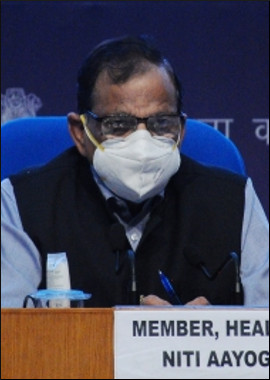|
|
|

|
Worst is not yet over, 100 cr vaccinations is a safety net: VK Paul
|
|

|
|
| Top Stories |
 |
|
|
|
Avinash Prabhakar | 24 Oct, 2021
"The worst is not over yet. We have created a safety net of 100 cr
vaccinations but those who have not been vaccinated yet should come
forward to get the vaccine to complete this safety net", said V.K. Paul,
Member (Health), NITI Aayog, in an exclusive interview with IANS. He
said that talks with WHO for Covaxin EUL approval are in the final
stage.
Excerpts from the interview:
Q: India has achieved 100 crore vaccinations. Can we say the worst is over now?
A:
This achievement is a momentous landmark for the country. But the worst
is not over yet. We have created a safety net of 100 cr vaccines around
us, but those who have not been vaccinated yet should come ahead to get
vaccinated and complete this safety net.
Not many in the world
would have thought India could administer vaccines to a billion people
in 9 months. And, that too with two vaccines made on the soil of India.
It is a grand example of 'Atmanirbhar Bharat'. Apart from providing
protection against the deadly disease, this success has given us
confidence that we can handle a crisis of this magnitude on our own.
Going forward, I am optimistic, that not only can we change the course
of the pandemic globally, but also revolutionise the research and
development to address other diseases effectively.
Q: How has been India's journey to achieve this milestone?
A:
To reach here, the country overcame people's apprehensions about safety
and usefulness of the vaccines. Vaccine hesitancy due to ignorance,
bias, misleading propaganda has been largely overcome. Challenges of
vaccine supply, transportation, cold chain dynamics and vaccine centre
logistics were met building on the invaluable experience of the
universal immunization program. Communication efforts were directed to
educate, assure, motivate and prepare the public through transparent,
science-driven, consistent and multi-pronged messaging. CoWin IT
platform emerged as the master enabler for beneficiary interface,
session planning, certification and data management.
Our
scientists, doctors, entrepreneurs, industry leaders have all
contributed to this effort. They have been fighting social and
geographical odds at various levels to bring people to the vaccination
centres. The 100 crore mark demonstrates the reach and resilience of our
public health system.
Q: What did the government do to facilitate, support and encourage research and development of the vaccines?
A:
For a nation that is admired as the 'pharmacy of the world' and that
delivers two-thirds of all the world's vaccines for children, to pick up
the challenge to develop/manufacture COVID-19 vaccines was a given.
Prime Minister guided and mentored this journey from the very start.
The
government established a task force as early as in April 2020 to
oversee, support, encourage and monitor R&D initiatives amongst the
research organizations and in the industry. Potential candidate vaccines
were tracked and supported with research and development grants.
Department of Biotechnology (DBT) and the Indian Council of Medical
Research (ICMR) opened their laboratories for complex assays by research
groups and industry. ICMR provided the vaccine virus strain to the
industry to develop Covaxin. DBT readied eighteen vaccine trial field
sites that were used by industry for trials. Government launched a 900
Cr Mission COVID Suraksha to fund multi-level R&D efforts.
At
least eight entities have received large grants. Government also made
outright advance purchase commitment for a vaccine still under
development. National Expert Group on Vaccine Implementation (NEGVAC)
provided guidelines on the vaccine program. Government teams have been
in touch with manufacturers on a continuous basis, Regulatory steps were
streamlined and all facilitation was ensured.
Today,
made-in-India Covishield (serum) and Covaxin (Bharat) have been the
bedrock of our program so far. But our industry has lined up four other
vaccines for potential use in the coming months: a DNA vaccine (Zydus,
already licenced), a mRNA vaccine (Gennova), a protein sub-unit vaccine
(BioE) and an intranasal vector vaccine (Bharat).
Q: What are India's concerns at this stage?
A:
The country is at a critical juncture right now. We have to accomplish a
high vaccine coverage with the full 2-dose course. We need to remain
vigilant and keep looking for new virus variants. Occurrence of the
variants of concern is unpredictable. A dangerous new variant in any
part of the world is a threat to all; and that is the real worry. It is
the biggest unknown over which we have little control except to reduce
transmission by all means. Our surveillance teams have to keep track of
new variants, and our vaccine scientists and industry have to be ready
to tweak the vaccines if required. In addition, the search for an
effective drug that averts progression of early infection into serious
disease is an urgent need. This virus can only be defeated by scientific
tools and products.
Q: What is causing delay in granting WHO emergency use approval to Covaxin?
A:
Talks with the World Health Organization are in the final stage now to
grant EUL to Covaxin. We respect the WHO procedure which is totally
science and evidence based in granting the approval to vaccines. The
final meetings are scheduled and we hope to get good news soon from WHO.
|
|
|
| |
|
|
|
|
|
|
|
|
|
|
|
|
|
|
| |
| Customs Exchange Rates |
| Currency |
Import |
Export |
US Dollar
|
84.35
|
82.60 |
UK Pound
|
106.35
|
102.90 |
Euro
|
92.50
|
89.35 |
| Japanese
Yen |
55.05 |
53.40 |
| As on 12 Oct, 2024 |
|
|
| Daily Poll |
 |
 |
| Will the new MSME credit assessment model simplify financing? |
|
|
|
|
|
| Commented Stories |
 |
|
|
|
|
|
| |
|